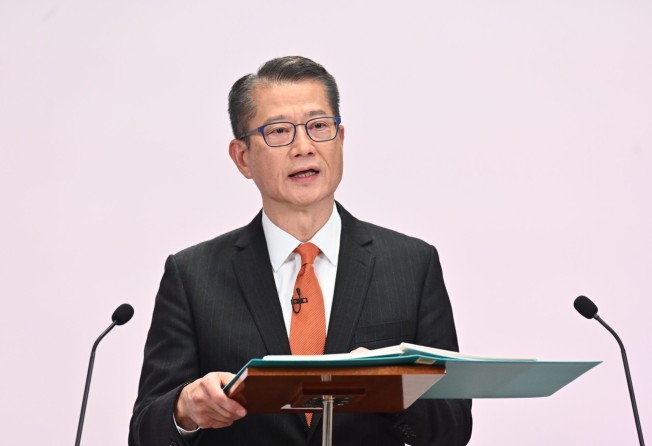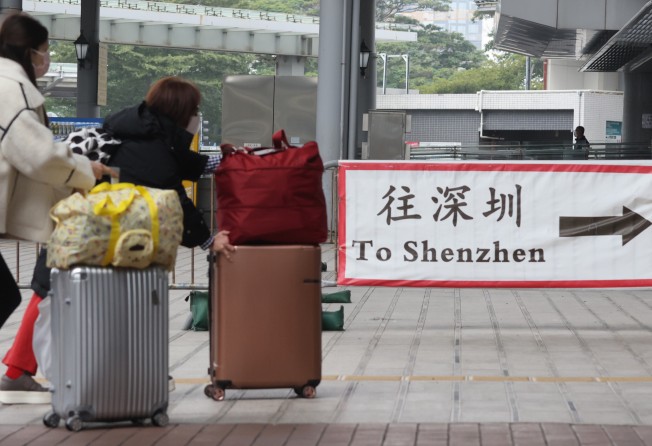
Coronavirus Hong Kong: quarantine-free travel to mainland China could resume in second half of year, ‘everything in order’ with stock market, finance chief says
- Paul Chan says the city hopes ‘to put the pandemic under control in the coming two to three months’, laying the groundwork for restarting quarantine-free cross-border travel
- Finance chief attributes a recent plunge in city’s stock market to correction in tech stocks and heightened risk-aversion sentiment

Hong Kong’s finance chief has said quarantine-free travel with mainland China could resume in the second half of this year, while also reassuring the public the city’s stock market has been functioning normally despite a huge plunge on Tuesday.
Financial Secretary Paul Chan Mo-po attributed the recent tumble to a correction in tech stocks and heightened risk-aversion sentiment in the market, adding that everything was in order as the government had already looked into different market elements.
Speaking at a Redefining Hong Kong seminar organised by the Post on Wednesday, Chan also signalled that the government was ready to resume business with the international community, as a high-level summit in November was being planned.
But Chan said the government’s most important task was taming the current wave of infections by bringing the city’s situation in line with the mainland’s “dynamic zero infection” approach, before travel could return and businesses could operate fully again.
“We hope we will be able to put the pandemic under control in the coming two to three months … Aligning our practices with the mainland will enable us to [restart] the quarantine-free travelling with the mainland,” Chan said.
“That is a target that we are working very hard towards at the moment. It would hopefully be in the second half of this year, depending on how fast the current wave of the pandemic could be put under control, and [on] the Covid situation on the mainland.”

Chan said a broad resumption of cross-border travel would not only allow long-separated family members to reunite, but also lead to a business and economic revival, as the “mainland is the biggest market for Hong Kong”.
Chan’s optimism at the prospect of a rebound came as the city was still battling its Omicron-fuelled fifth wave of infections. On Wednesday, Hong Kong recorded 29,272 Covid-19 cases and 279 related deaths, pushing the city’s overall tally to more than 975,000 confirmed cases.
As for reviving the city’s damaged reputation as an international business hub, Chan said the government was planning a high-level investment summit to coincide with the Hong Kong Sevens, which was pushed back to November 4 due to the pandemic. Reconnecting with the international community after years of travel bans and tight entry restrictions was “important”, he added.
“The idea is to bring over 100 finance leaders to Hong Kong,” he continued. “We want to bring them over for them to see the situation for themselves, to bring about business and investment opportunities.”
However, Chan stopped short of providing a time frame for reopening the city’s borders to the rest of the world, saying the local vaccination rate would be an influential factor.
“If we are able to increase the vaccination level continuously, and with international development in terms of drugs treating Covid, [and] the advancement in rapid tests, I think we are better equipped to use these technologies … to adapt a protocol that would be friendlier to international travelling. That’s something we are looking at,” he said.
More than 90 per cent of eligible Hongkongers have so far received at least one dose of a coronavirus vaccine, though Chan said the city was still playing catch-up in inoculating some demographics, including the elderly and children.
Among the wide-range of issues discussed in the seminar, Chan also addressed the recent tumble in the city’s stock market, saying that it was largely due to a downward adjustment of tech stock prices.
“Tech stocks are facing the risk of possible delisting from the US, and the interest rate environment may also affect their profitability forecast, while over the past few months the regulatory environment on the mainland could also have an impact on them,” he said.
“Considering that tech stocks now account for about one-third of our market capitalisation, the downward adjustment of their prices has a significant impact on our index and also our market sentiment … at the moment, we do think that this is a market adjustment.”
Chan added that the war in Ukraine and an increasing reluctance to take risks due to the ongoing epidemic situation were also among the factors that had influenced the market.
Hong Kong’s key stock index Hang Seng Index plunged to a 10-year low on Tuesday, but jumped 9.1 per cent to 20,087.50 at the close of Wednesday trading, the biggest advance since a 12.8 per cent surge seen during the post-Lehman crisis more than 13 years ago.
Chan said the government had looked into different areas such as the derivatives market, hedge fund positions, market liquidity and brokers.
“So basically, despite all this volatility, our market has been functioning well and orderly. There is no systematic risk that we need to worry about,” he said.
But Chan also pointed out that the potential “mass delisting” of an estimated 240 Chinese companies in the United States had put the city in an advantageous position, as heightened US scrutiny on these firms could see them move as much as 90 per cent of their market value onto the city’s bourse.
In a separate press conference on Wednesday, Chief Executive Carrie Lam Cheng Yuet-ngor also addressed the issue, saying financial markets being affected was inevitable under current global instability.
“[But] maybe the Financial Secretary will make a more professional judgment than me later,” she said.
Hong Kong’s overall economy saw a “visible recovery” in 2021, with gross domestic product (GDP) growth of 6.4 per cent. Chan also forecast a growth of 2 per cent to 3.5 per cent for this year during his budget speech last month.
In the one-and-a-half hour forum, Chan admitted that uncertainties had increased recently but “it was too early to draw any conclusions”.
“The mainland is still an important growth engine for the world. The United States is still growing quite strongly and we will continue to monitor the situation and see whether we need to make updates in the next part of this year. But I think at the moment it is too early to do that,” he added.
Attending the same seminar, Paul Ho Yiu-po, financial services tax leader with Ernst & Young Tax Services, proposed increasing the personal allowance for elderly taxpayers to attract them to rejoin the workforce given the city’s ageing population, as well as offering tax exemptions for bond and credit funds.
However, the finance minister said he would not consider giving privileges to elderly taxpayers as it would be unfair to others. He added that the government had set up a steering committee last year to study how to further develop the bond market.
Commenting on a rent deferral scheme, a centrepiece of his February budget, Chan confirmed an earlier Post report that it was approved by the Executive Council on Tuesday. He said he was aiming to enact it next month so that a moratorium could be imposed from May to July to prohibit landlords from taking legal action against tenants for failing to settle rental payments.
According to a paper submitted to the Legislative Council, the bill will be published in The Gazette this Friday and presented to lawmakers next Wednesday for the first reading.
Additional reporting by Natalie Wong